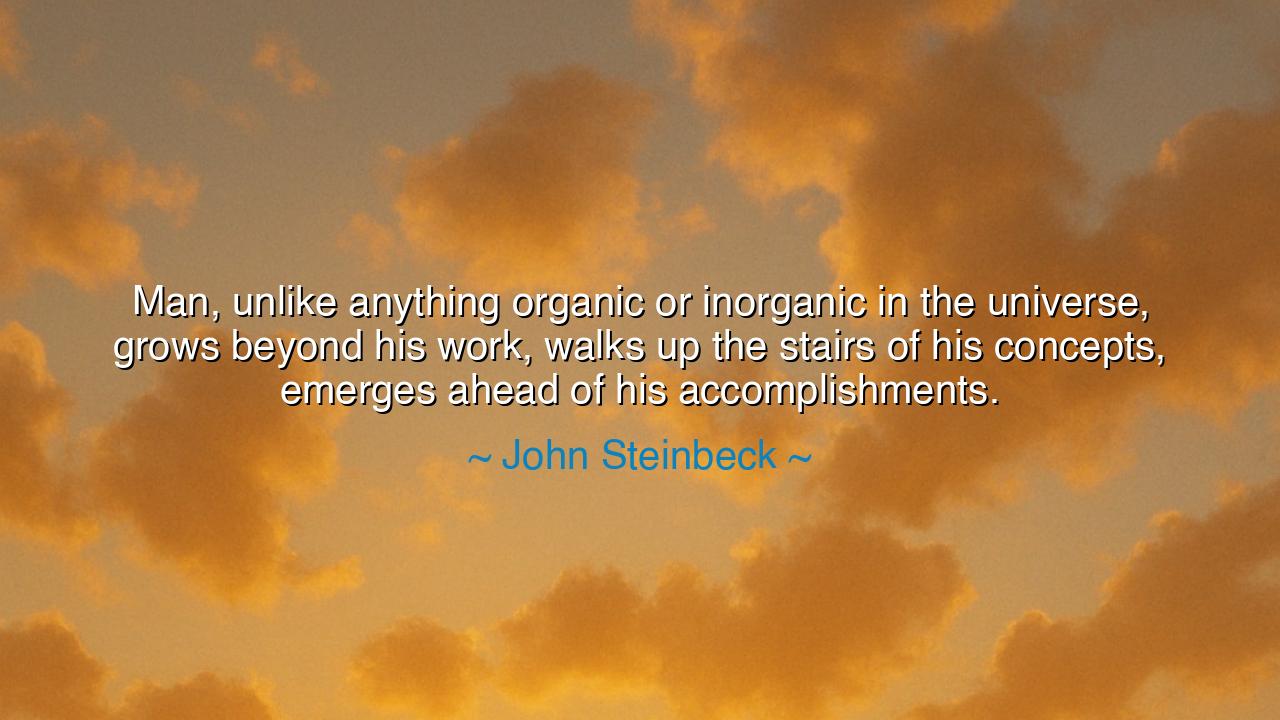
Man, unlike anything organic or inorganic in the universe, grows
Man, unlike anything organic or inorganic in the universe, grows beyond his work, walks up the stairs of his concepts, emerges ahead of his accomplishments.






The words of John Steinbeck—“Man, unlike anything organic or inorganic in the universe, grows beyond his work, walks up the stairs of his concepts, emerges ahead of his accomplishments.”—are a hymn to the singular nature of humanity. They remind us that while all other beings and all things of matter remain bound by their form and their function, man alone transcends. The stone rests as stone, the tree grows as tree, but man forges beyond what he creates. He is not confined by his work; he becomes something greater than the tools he fashions, the monuments he builds, the words he writes.
To grow beyond work is to embody the power of imagination and aspiration. Animals may labor by instinct—beavers build dams, ants raise colonies, bees form hives—but their works serve only survival, never transcendence. Man, however, builds not only for sustenance but for vision. He paints images of worlds unseen, writes philosophies that climb toward heaven, engineers machines that defy the bounds of earth. His creations are mirrors, yet he is always more than what he sees reflected in them. Steinbeck understood this, that man is forever climbing, his concepts serving as steps that lead him higher than any single accomplishment.
History offers vivid proof of this truth. Consider Leonardo da Vinci, who painted, engineered, studied anatomy, and dreamed of flight. None of his single works defined him, for he always stood beyond them, reaching for what lay just out of grasp. His sketches of flying machines, though never realized in his lifetime, testified to a mind that walked beyond its own age. His life embodies Steinbeck’s teaching: man is not the sum of his accomplishments, but the forward surge of spirit that outpaces them.
The ancients themselves honored this quality. Prometheus, in Greek myth, stole fire from the gods, not merely to warm the hands of men but to ignite their capacity for progress. Fire symbolized that upward striving, that restless growth which separates humanity from the fixed order of nature. Unlike the stars, bound to their courses, or the mountains, fixed in their grandeur, man carries within himself the power to surpass himself, to emerge ahead of what he has already achieved. This is his gift and his burden.
The meaning of Steinbeck’s words is both noble and sobering. It is noble because it celebrates human restlessness—the fact that we are never satisfied with what we have made, but always yearning for more. It is sobering because it reminds us that accomplishments alone cannot contain our essence. To mistake our work for our self is to confine the infinite within the finite. True wisdom is to see ourselves as beings forever unfolding, forever unfinished, always called to ascend higher.
For us, the lesson is clear: we must not cling too tightly to our past deeds, nor measure ourselves only by what is visible or complete. Our worth lies not in monuments, careers, or possessions, but in the spirit that conceived them and moves ever onward. Just as a climber does not stop at one step of the stair, so we must continue to walk up the stairs of our concepts, daring to think beyond the horizon of what is already achieved.
The practical action is this: cultivate imagination, nurture vision, and do not let accomplishments lull you into complacency. Celebrate what you create, but do not dwell there. Ask always, “What lies beyond this? What more can I imagine, what more can I become?” Read deeply, dream boldly, and push your work toward the service of something greater than yourself. In doing so, you honor the divine spark that Steinbeck saw within man—the flame that drives him to exceed every boundary set before him.
Thus let us pass down this teaching: man is not defined by what he has built, but by his unending capacity to transcend his own building. He is the being who always grows beyond his work, who climbs upon his own concepts, who steps ahead of his own shadow. This is the glory and destiny of mankind: never finished, never bound, always rising toward the light of the infinite.






AAdministratorAdministrator
Welcome, honored guests. Please leave a comment, we will respond soon